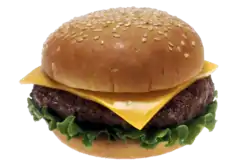Patty
A patty or burger (in British English) is a flattened, usually round, serving of ground meat and/or legumes, grains, vegetables, or meat alternatives. Patties are found in multiple cuisines throughout the world.
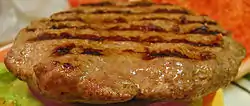 A ground beef hamburger patty | |
| Alternative names | Burger |
|---|---|
| Type | Main dish, Sandwich |
| Serving temperature | Hot |
| Main ingredients | Ground meat, meat alternatives, vegetables, grains, and/or legumes |
In British English, minced meat that is formed into a disc is called a burger, whether it is in a bread roll or not. The word “patty” is used in American English but almost unknown in British English.
The ingredients are compacted and shaped, usually cooked, and served in various ways. Some foods termed "patties" use ingredients inside a pastry crust that is then baked or fried. Some patties are breaded, then baked or fried.
Etymology
The term originated in the 17th century as an English alteration of the French word pâté.[1] According to the OED, it is related to the word pasty, which is various ingredients encased in pastry.[1]
Terminology
The term "patty" is used in many varieties of English, but less frequently in Britain and Ireland than in the United States.[2] Merriam-Webster defines it as "a small flat cake of chopped food",[3] Cambridge as "pieces of food, especially meat, formed into a thin, circular shape and then usually cooked".[4] In some countries, patties may be called "discs."[5]
Similar-shaped cakes not made from ground beef may also be called "burgers": "fish burgers" may be made from reshaped mechanically separated meat.[6] Patties made from chicken meat may be called chicken patties.
Veggie burger patties are made without meat and instead use legumes, grains, other mixed vegetables, and/or soy products such as tofu or tempeh or seitan, a product made of wheat gluten, often mixed with a binding agent.[7][8][9]
Variations and serving styles
Croquettes
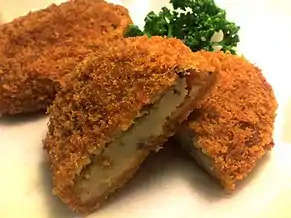
Patties can be breaded and deep-fried, producing croquettes such as crab cakes.[10] In Ireland, traditional chippers often serve batter burgers (a beef-based patty dipped in batter and deep fried). A batter burger served as a sandwich is called a wurly burger, and is believed to have been invented by the Mona Lisa chipper in Crumlin, Dublin.[11] In Japan the Korokke is an example.[12] Rissoles are meat (typically beef), or fish and other ingredients, coated in breadcrumbs or less frequently battered, and deep-fried; they are found in various European cuisines.[13]
Cutlets
.jpg.webp)
Patties can be treated as a cutlet and eaten with a knife and fork in dishes like Salisbury steak, the German Hamburg steak, or the Serbo-Croatian pljeskavica, or with chopsticks in dishes such as Songjeong tteok-galbi.[14][15] Other examples include the Russian Pozharsky cutlet.[16][17]
Fritters
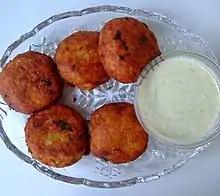
Aloo tikki is a potato patty that originated in the Indian subcontinent.[18] A related dish is ragda pattice, which covers the potato patty in a gravy.[19]
An arepa is a dish of maize and other ingredients shaped into a patty and griddled; it has been eaten in parts of Central and South American since pre-Columbian times.[20]
Quenelles
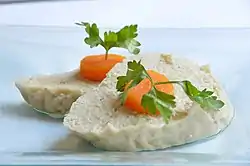
Gefilte fish is often served as a quenelle, a patty shaped into a flattened egg.[21]
Sandwich fillings
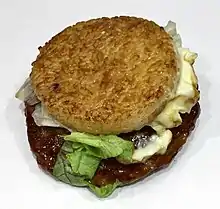
Patties are often served as sandwiches, typically in buns, making a type of sandwich called a "burger", or a hamburger if the patty is made from ground beef, or sometimes between slices of bread. An American patty melt is a ground beef patty topped with melted cheese (typically Swiss) served on toasted bread, typically rye.[22]
In Ireland, traditional chippers often serve sandwiches called spice burgers.[23] The spice burger is made to a specific recipe developed in the early 1950s by pork butcher Maurice Walsh, and later manufactured and sold by Walsh Family Foods Limited[24] and then Keystone Foods.[25]
In Japan and Korea a ground beef patty is sometimes served as a sandwich on a "bun" made of compressed rice; the sandwich is called a rice burger.[26]
Tartares
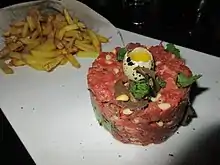
Some patties, like steak tartare and Middle Eastern kibbeh nayeh, are served raw.[27][28]
Turnovers
Patties can be encased in pastry and baked or fried, producing turnovers such as Cornish pasties. A Jamaican patty is cooked, spiced ground beef sealed inside a pastry crust and baked.[29]
Commercial production
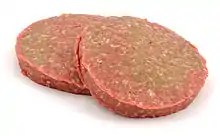
Commercially-produced patties are machine-formed.[9]
With mass-produced patties, it is not uncommon to find them with seemingly abnormal shapes or a bumpy perimeter. These groove-like bumps are caused by the machine that forms the patties. They are used in production to keep the patties in line, so they will not fall off the assembly line, and can be manipulated by the various machines. In other boxed patties, small punctures can be seen in the top and bottom sides of the patty. These punctures are there for similar reasons.
See also
- Kofta, a related dish that is formed into patties or balls
- List of hamburgers
- Meatball, a similar dish but rounded rather than flattened
References
- "Patty | Definition of Patty by Oxford Dictionary on Lexico.com also meaning of Patty". Lexico Dictionaries | English. Retrieved 24 September 2020.
- Google ngrams comparison of the phrase "hamburger patty/ies" in US and UK English.
- "Definition of PATTY". www.merriam-webster.com. Retrieved 24 September 2020.
- "PATTY | definition in the Cambridge English Dictionary". dictionary.cambridge.org. Retrieved 24 September 2020.
- Malkin, Elisabeth (6 April 2019). "'Veggie Discs' Could Replace Burgers Under European Food Labeling Proposal". The New York Times. ISSN 0362-4331. Retrieved 24 September 2020.
- "Potentiality of Using Mechanically Separated Meats of Nile Tilapia in Fishburgers: Chemical, Physical and Sensory Characterization". Brazilian Archives of Biology and Technology. 28 November 2019. Retrieved 25 September 2020.
- "What's Inside Your Veggie Burger?". Archived from the original on 23 December 2017. Retrieved 8 October 2015.
- "A Breakdown of What's Inside Your Veggie Burger". Spoon University. 10 June 2016. Retrieved 24 September 2020.
- "How It's Made: Veggie Burgers". Science Channel. 8 July 2011. Retrieved 24 September 2020.
- "Bitter Strikes Brought Deviled Crabs | Cigar City Magazine". archive.vn. 22 July 2012. Retrieved 24 September 2020.
- Mullally, Una (23 May 2011). "On the batter for National Fish and Chips Day". The Irish Times. Retrieved 25 September 2020.
- "Korokke no Rekishi (The history of Korokke)".
- Rissoles FoodsOfEngland.co.uk. Accessed July 2020.
- "Tteok-galbi" 떡갈비. Korean Food Foundation (in Korean). Retrieved 2 August 2017.
- Bartholomeusz, Rachel (5 May 2016). "Is there a wrong way to use chopsticks?". SBS. Retrieved 2 August 2017.
- Павел Сюткин, Ольга Сюткина. Непридуманная история русской кухни. Котлетная история. Moscow: Астрель, 2015 (in Russian). ISBN 978-5-45717-598-3.
- Н. А. Лопатина. История пожарских котлет. Тверь: ТО "Книжный клуб", 2014 (in Russian). ISBN 978-5-903830-44-2
- "At Houses Of Worship, Women Serve Food For A Higher Purpose". NPR.org. Retrieved 24 September 2020.
- "Ragda Patties: The Crispy Potato Patty and Chickpea Curry Combination That Will Set Your Heart Racing". NDTV Food. Retrieved 24 September 2020.
- "Arepas Are Conquering The World — But Dying At Home In Venezuela". NPR.org. Retrieved 24 October 2017.
- Marks, Gil (17 November 2010). Encyclopedia of Jewish Food. HMH. ISBN 978-0-544-18631-6.
- Ellis-Christensen, Tricia. "What is a Patty Melt?". Wisegeek. Retrieved 17 June 2014.
- "Legal row over spice burger 'secret recipe'". RTÉ. 25 August 2009. Retrieved 29 September 2009.
- Kelly, Fiach (1 October 2009). "Spice Burger secret is safe as recipe row settled". Irish Independent. Retrieved 24 September 2020.
- Flanagan, Peter (3 February 2012). "Popular Spice Burger saved as Walsh firm is taken over". Irish Independent. Retrieved 24 September 2020.
- Walker, Harlan (1997). Food on the Move: Proceedings of the Oxford Symposium on Food and Cookery, 1996. Oxford Symposium. ISBN 978-0-907325-79-6.
- Murrey, Thomas Jefferson (1887). "Eating Before Sleeping" (PDF). Cookery for Invalids (1st ed.). New York City: White Stokes & Allen. pp. 30–33. Retrieved 24 December 2013.
- Marks, Gil (17 November 2010). Encyclopedia of Jewish Food. HMH. ISBN 978-0-544-18631-6.
- Michelle Garcia For N.Y. Caribbean Beef Patty Co., Business Is Cooking 14 February 2005; Page A03 Washington Post
